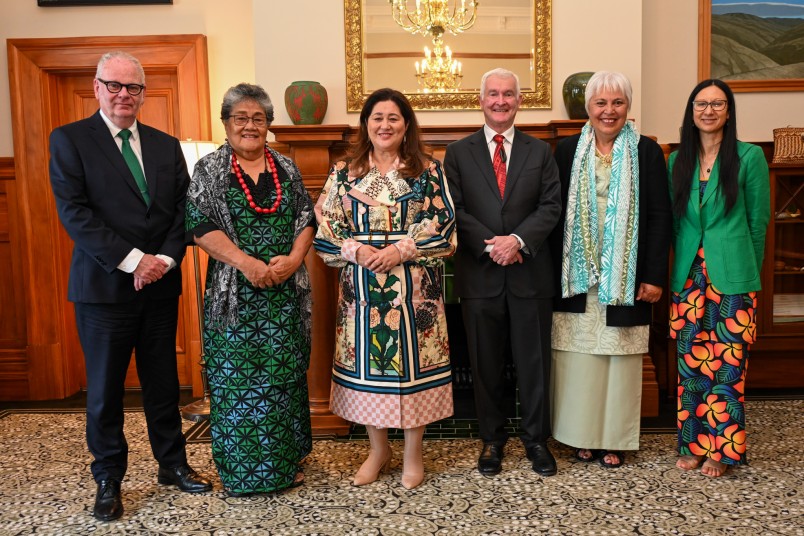- Talofa
- Mālō e lelei
- Bula
- Kia orāna
- Fakalofa lahi atu
- Mālo ni
- Fakatalofa atu
- Mauri
- Halo olaketa
- Ekamawir omo
- Lakwe
- Bonjour
- Alii
- Halo
Tēnā koutou katoa.
A warm welcome to the Public Service Commissioners who have gathered here today.
As it happens, last week I hosted members of the New Zealand Public Service on our Public Service Day, and acknowledged individuals deserving of recognition for their exemplary service on behalf of their fellow New Zealanders.
Today, I am honoured to host their counterparts from the Pacific Islands, who lead the administration of government in the delivery of a broad range of core public services.
I know that this Fale is fortunate to build on the geographical, historical, cultural, economic and familial ties between the peoples of the Pacific. We share a remarkable heritage, descended as we are from resourceful and resilient people who ventured across the length and breadth of the Pacific Ocean, in search of new opportunities and a better and more sustainable future. It’s a quest that still motivates us to work for the betterment of our communities.
I can personally vouch for the strong sense of whakapapa ties Māori feel when we visit Pacific Island groups. Our connections have been highlighted and strengthened by the revival of traditional knowledge, and the re-imagining and re-writing of ancient histories.
Aotearoa New Zealand is now home to over 380,000 people of more recent Pacific Island descent, who I presume will possibly include members of your own families, who are proud to retain dual identities and their close ties with their homelands.
During my time as Governor-General, I am striving to connect with and honour New Zealand’s Pacific communities, which contribute so much talent and expertise across every sector in New Zealand.
In my role, I also have the honour of representing my fellow citizens on significant occasions in the Pacific – including, possibly later this week, the opening of the Pacific Games in the Solomon Islands.
During my official visits to the Cook Islands and Samoa, I saw for myself how Pacific nations are facing the impacts of pollution and the climate crisis, including the rise in sea levels and the declining health of the ocean.
I also witnessed the determination to address these ecological issues, whether that be in the international arena, regional initiatives such as the Blue Pacific project, or local nature-based projects.
These challenges, along with the current geopolitical interest in the Pacific region, will be adding to the increasing demands on the public service to provide effective advice to governments and to assist in the achievement of policy and operational outcomes.
I trust this Fale is proving to be a valuable vehicle to develop and consolidate such talent and expertise in the public sector. After a two-year hiatus due to COVID-19, I imagine you will welcome the opportunities available this week to share innovative ideas and develop effective partnerships.
This week, I’m sure your thoughts will be turning to the outcomes of the recent Pacific Island Forum in Rarotonga, and will soon turn to preparation for next year’s CHOGM in Samoa.
I hope the coming few days are fruitful and energising, as you meet up with colleagues who understand the responsibilities you share to manage risk and seize the opportunities that lie ahead.
I trust you will return to your work with a renewed unity of purpose, underpinned by the characteristic energy and resourcefulness of Pacific peoples – past and present – in your pursuit of a better future for all.
I conclude with these reflections on selfhood and community from His Highness Tui Atua Tupua Tamasese Efi:
‘I am not an individual; I am an integral part of the cosmos. I share divinity with my ancestors, the land, the seas and the skies. I am not an individual, because I share a tofi (inheritance) with my family, my village and my nation. I belong to my family and my family belongs to me. I belong to my village and my village belongs to me. I belong to my nation and my nation belongs to me. This is the essence of my sense of belonging.’

